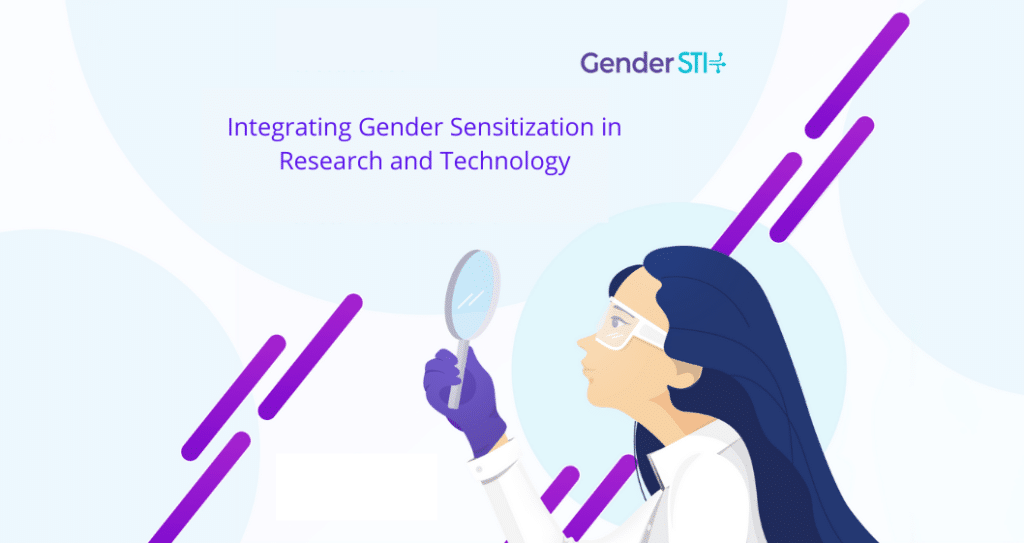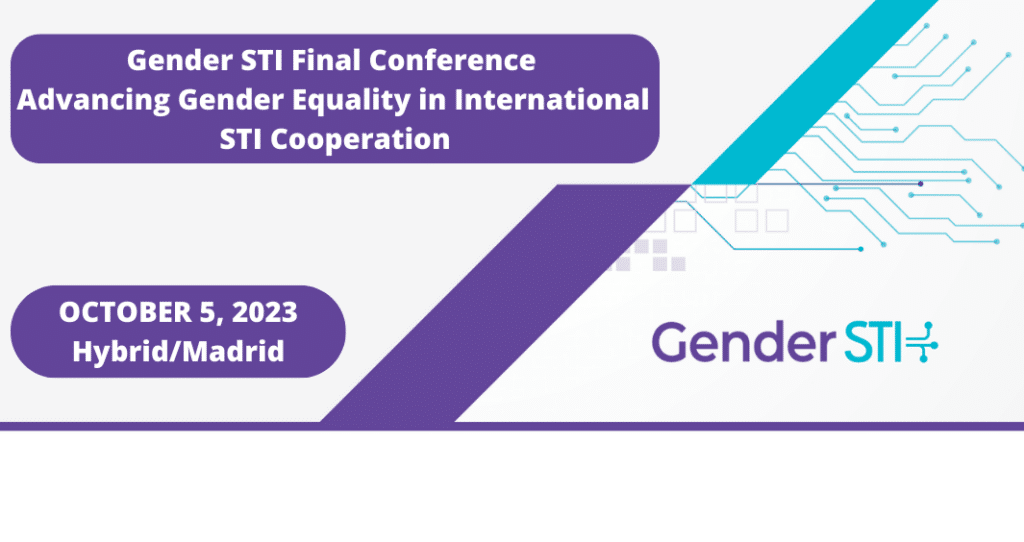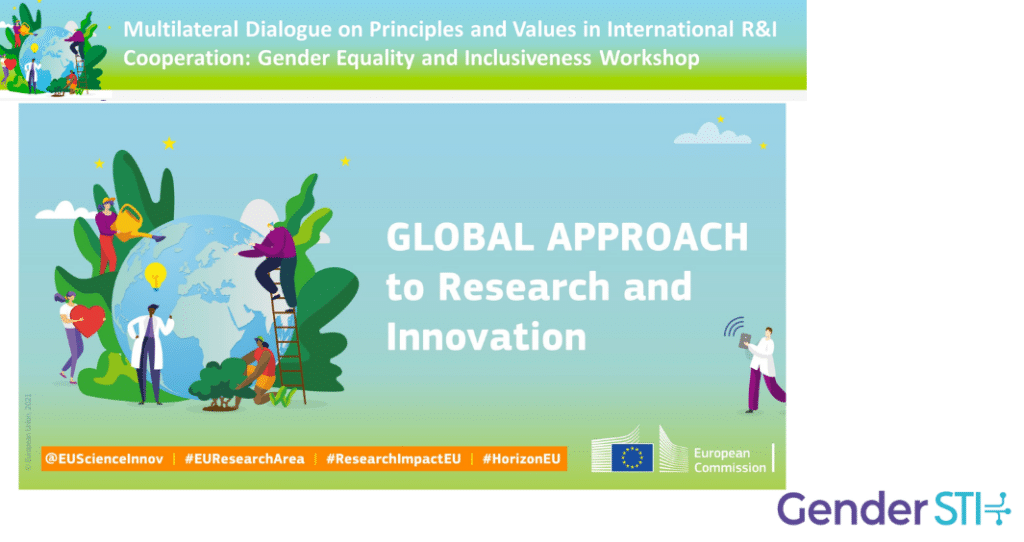On April 4th, 2023, the Gender STI project took part in the third online workshop as part of the Multilateral Dialogue on Values and Principles for Research and Innovation (R&I) organized by the European Commission. The workshop focused on Gender Equality and Inclusiveness in R&I and aimed to foster a common understanding of the principles and values underlying international R&I cooperation. The event brought together around 80 participants from 39 countries and various European and international organizations.
The workshop was introduced by Dr. Martin Penny, Head of Unit, Directorate for Global Approach & International Cooperation in DG R&I, European Commission, and Dr Armela Dino, from the Spanish Ministry of Science and Innovation. Then, Yolanda Ursa presented the results of Gender STI project and highlighted that there are a lot of commonalities between European and third countries on what needs to be done to include and improve gender equality in international cooperation in R&I. The Gender STI investigation revealed that inclusivity and intersectionality aspects related to gender are increasingly considered in bilateral and multilateral STI dialogues and that cultural differences need to be considered to advance the integration of gender equality in dialogues between Europe and third countries.
Thematic Breakout Sessions
The workshop's discussions revolved around four key thematic breakout sessions, each addressing critical challenges related to Gender Equality and Inclusiveness in the context of R&I.
- The under-representation of women in STEM
The participation of women in STEM, including Information and Communications Technology (ICT) fields is between 20%-30% in most countries, with some country’s exceptions and differences between disciplines. The leaky pipeline phenomenon, where women leave STEM career paths at different stages, particularly after obtaining a Ph.D. or completing their first postdoc, was identified as a significant factor contributing to this disparity.
Key takeaways
- Implement STE(A)M approaches at lower education levels and in universities.
- Foster equal interest and engagement in STEAM fields for both girls and boys.
- Challenge stereotypes, outdated gender norms, hierarchies, and power structures.
- Create better conditions and support for women in STEM research and academia.
- Establish safe and inclusive R&I working environments and international mobility opportunities.
2. The under-representation of women in leadership and decision-making positions
The leaky pipeline issue in STEM careers also affects the under-representation of women in leadership and decision-making roles. It was noted that the absence of gender-balanced representation globally persists, and the COVID-19 pandemic further exacerbated gender inequalities.
Key takeaways
- Improve understanding of inequalities in career paths and address unconscious bias.
- Ensure fair, open, and gender-equal career opportunities in R&I organizations.
- Monitor and evaluate gender equality policies in institutions.
- Advocate for gender quotas and diverse appointment committees.
- Promote awareness, establish role models, mentorship programs, and inclusive language.
3. Gender-based violence and sexual harassment in the R&I system
Several countries lack adequate policies and data to address gender-based violence (GBV) and sexual harassment in R&I. Establishing an evidence base was identified as a crucial first step.
Key takeaways
- Establish clear definitions, terminology, and legal frameworks to combat GBV and sexual harassment.
- Ensure consistent policy support and prevent pushbacks and "gender fatigue."
- Integrate provisions against GBV and sexual harassment in Gender Equality Plans.
- Conduct studies and collect data on GBV and sexual harassment.
- Establish infrastructure, reporting procedures, and support services to address gender-based violence.
4. The low integration of a gender dimension in R&I content
The need to consider gender differences in R&I content, including biological, social, and cultural aspects, was highlighted. The under-representation of women in STEM can hinder the integration of the gender dimension, leading to biases in fields like Artificial Intelligence.
Key takeaways
- Establish clear terminology and principles for integrating sex, gender, and intersectional analysis in R&I content.
- Ensure funding allocation is not affected by gender biases.
- Support the exchange of good practices and monitor the integration of the gender dimension in research proposals and publications.
The final remarks from Maria-Cristina Russo, Director for Global Approach & International Cooperation in R&I at the European Commission, concluded that ensuring equality and inclusiveness is paramount to increasing the competitiveness and societal relevance of R&I.
The Multilateral Dialogue workshop on Gender Equality and Inclusiveness in R&I provided a platform for sharing practices, policies, and initiatives to enhance international collaboration. The discussions shed light on common challenges and the importance of a coordinated meta-approach to promote gender equality and inclusiveness in R&I. It emphasized the need for diverse perspectives, accountability, data collection, institutional change, and the integration of gender dimensions throughout the research process.
Check out the full report to learn more about the main insights and takeaways.



